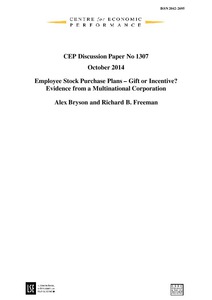Employee stock purchase plans - gift or incentive? Evidence from a multinational corporation

Bryson, Alex ; Freeman, Richard Barry
London School of Economics and Political Science. Centre for Economic Performance
LSE - London
2014
21 p.
profitability ; wage incentive ; workers stock ownership
CEP Discussion Paper
1307
Wages and wage payment systems
English
Bibliogr.
"Many large listed firms offer workers the opportunity to buy shares in the firm at discounted rates through employee stock purchase plans (ESPP). The discounted rate creates a gift exchange, where the firm hopes that workers who accept the gift reciprocate with greater loyalty and effort. But ESPPs diverge from standard gift exchange or efficiency wage models. Employees have to invest some of their own money by purchasing shares at the discounted rate to accept the gift. A sizeable number choose to reject the gift. In addition, the value of the ESPP gift varies with the share price and thus with the performance of the firm and the effort of workers in total. For workers who buy subsidized shares, an ESPP sets up a group incentive pay system analogous to profit sharing, all-employee stock options, or an employment ownership scheme that makes part of workers' compensation depend on company performance."
Digital
The ETUI is co-funded by the European Union. Views and opinions expressed are however those of the author(s) only and do not necessarily reflect those of the European Union or the ETUI.